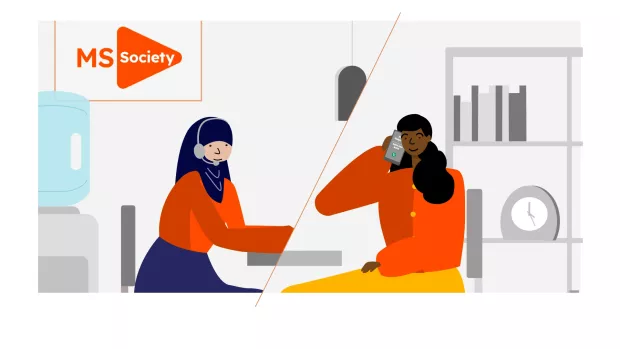
Universal Credit
You might be able to claim Universal Credit if you’re not in work or your income is low.
Universal Credit has replaced these ‘legacy’ benefits for most people:
- Housing Benefit
- income-related Employment and Support Allowance (ESA)
- income-based Jobseeker's Allowance (JSA)
- Child Tax Credit
- Working Tax Credit
- Income Support
Universal Credit is one payment, usually paid monthly and based on all your household’s circumstances.
How much could I get with Universal Credit?
How much you get for Universal Credit depends on your household’s circumstances. The single payment is made up of a 'standard allowance' and extra amounts if they apply to your situation.
For example, you might get more depending on how your MS affects you, if you get help with housing costs, or if you look after children.
What if I still get a ‘legacy’ benefit?
Universal Credit is being rolled out gradually. If you still get one of the benefits it replaces, you might be contacted by the Department for Work and Pensions (DWP) about moving to Universal Credit.
When this might happen depends on where you live. But Universal Credit is expected to be across the UK by 2024.
You could be asked to move to Universal Credit if your circumstances change and you need to let the DWP know – though not all changes mean you need to move across.
Get advice before you make any changes, because it could affect how much you get or other benefits.
The Work Capability Assessment and Universal Credit
Depending on how your MS affects you, you might be asked to complete the 'Work Capability Assessment' as part of your claim.
This is so the DWP can assess how any health conditions affect the work you could do. They use it to decide:
- how much you can get
- if you need to prepare for future work
To complete the assessment, you need to explain how well you can do different activities. It can be stressful, involving a questionnaire as well as a face-to-face or telephone assessment.
We hope our step-by-step guide to the Work Capability Assessment makes the task a little easier, but the MS Helpline is also here if you need information or support. They talk to people every week about benefits issues.
Find out more about Universal Credit before you claim
It’s important to be sure you want to go ahead before making a claim.
If you get one of the legacy benefits at the moment, you might not be better off changing to Universal Credit. And once you’ve begun a claim you can’t go back to the old benefit.
A benefits calculator could help you check what to expect, but you might also want to speak with a benefits adviser.
Find out more from:
- the benefits calculators at gov.uk
- our MS Benefits Advice Service
- Citizens Advice who can help find local advisers
- Disability Rights UK factsheet on Universal Credit
Make a claim for Universal Credit
There are several steps to claim Universal Credit, often including the Work Capability Assessment.
The Department for Work and Pensions (DWP) uses that assessment for ‘new style’ ESA as well as Universal Credit. If you’re claiming both at the same time, one assessment should cover both benefits.
Our free booklet has more details to help you complete the Work Capability Assessment. Read or order The Work Capability Assessment for ESA and Universal Credit booklet
Step-by-step process to apply for Universal Credit
- Start your claim online (by phone if you can’t get online)
- Attend an appointment with your JobCentre work coach (this is usually over the phone)
- Get your first payment (at the ‘assessment rate’)
- Give details about how your MS or other condition affects how you could work (the ESA50 form)
- Attend a Work Capability Assessment (this could be by video, phone or in person)
- Get a decision on whether you can still get ‘new style’ ESA and whether you’re in the work-related activity’ group or the ‘support’ group
- If you disagree with the decision, you can ask them to consider it again
Find out if you might be eligible and start a claim for Universal Credit online at gov.uk
Can I challenge a decision on my Universal Credit claim?
If you disagree with a decision made about your Universal Credit claim, you might want to challenge it. For example, if you're declared 'fit for work' in the Work Capability Assessment but you don't think that's correct.
The first step is called a 'mandatory reconsideration'. If that doesn't resolve things, you can appeal.
Before you start a challenge, get support from Citizens Advice or a benefits adviser. A lot of appeals are successful, particularly when people get help.
And if you haven’t already got them, ask the DWP office dealing with your claim for a copy of the assessors’ report and a ‘written statement of reasons’ for their decision.
That way, you’ve got all the details they have.
You won’t be alone if you feel frustrated or disappointed by the decision you want to challenge.
You can call the MS Helpline on 0808 800 8000 if you want to let off steam, get support or discuss your next steps.
Our free booklet on the Work Capability Assessment has step-by-step information about challenging a decision. Read or order The Work Capability Assessment for ESA and Universal Credit booklet


